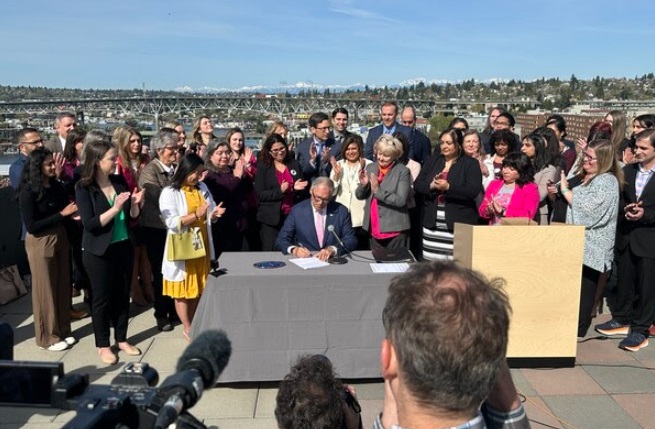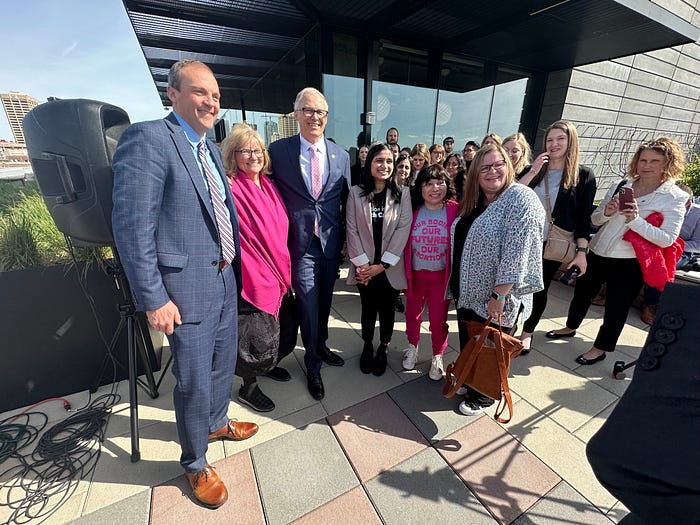
OLYMPIA, WA – Washington State Governor Jay Inslee today signed five health-related bills that were approved by state lawmakers during their recent legislative session. The measures will protect access to a common abortion medication; enhance data privacy for people who share their health information with third-party apps; protect Washington patients and providers who may face legal threats from other states; protect providers’ licenses; and eliminate out-of-pocket costs to make abortion access more equitable.
“The right of choice is an issue of freedom,” Inslee says. “Health care must remain the providence of individual Washingtonians. These laws will keep the tentacles of oppressive and overreaching states out of Washington.”
The U.S. Supreme Court’s Dobbs decision last year overturned Roe v. Wade which the Governor’s office says unleashed a multi-pronged attack on reproductive freedom nationwide.
From Governor’s Office:
Protecting abortion medication access
In anticipation of a Trump-appointed judge’s ruling pulling a common and safe abortion pill from shelves nationally, the governor acted quickly to secure a three-year supply of mifepristone for the state that could be distributed regardless of federal court action.
With the 30,000 doses being held by the state Department of Corrections, all that was left to do was pass a bill that authorized the department to distribute the medication to health providers. Sen. Karen Keiser sponsored SB 5768, which does just that.
“The people of Washington have demonstrated time and again — in polls and at the ballot box — that we support the right to reproductive freedom,” Keiser said when she introduced the bill. “But that right means nothing without actual access to care. For 10,000 women every year in our state, that right comes down to having access to mifepristone. We cannot allow an unelected judge in Texas to ignore more than two decades of evidence and deny Washingtonians a safe, effective medication for their reproductive choice.”
Three days after the state announced the stockpile, the Texas judge ordered the Food and Drug Administration to pull its authorization for the pill. The decision was appealed, and the U.S. Supreme Court stayed the Texas ruling until the appeal could be heard. The decision must also be reconciled with a conflicting federal court decision out of Spokane the same day that ordered the FDA to preserve access to the pill in 17 states.
Shielding providers and patients from other states
This week, North Dakota became the 14th state to ban most abortions. Earlier this month, Washington’s neighboring state of Idaho adopted a law banning providers from even discussing abortion with a patient and became the first in the nation to ban interstate travel of minors seeking abortion care. While the constitutionality of those laws is dubious, Washington leaders are proactively putting protections in place to counteract attempts to interfere with patients receiving abortion care or gender-affirming care in Washington state.
Inslee signed Rep. Drew Hansen’s Shield Law, HB 1469. The bill prohibits compliance with out-of-state subpoenas related to abortion and gender-affirming care services; prevents cooperation with out-of-state investigations; bans extraditions related to abortion and gender-affirming care services that occur legally in Washington; and protects providers from harassment for providing these services.
“As soon as the draft Dobbs decision leaked, we know other states would be creative and aggressive in restricting access to abortion. We also knew that we would need to be creative and aggressive in fighting back,” Hansen said when the bill passed the state Senate. “We are committed to using every tool we have available to protect people in Washington from the reach of anti-abortion laws in Texas and elsewhere.”
Health Care Provider Protections
Inslee also signed a bill to ensure health providers can’t be disciplined for providing legal reproductive health services or gender-affirming care in Washington. HB 1340, sponsored by Rep. Marcus Riccelli, protects health providers from disciplinary action or having their licenses revoked for “unprofessional conduct” if the care provided follows state law, regardless of where their patient resides. Any provider punished under another state’s laws would not have their license denied in Washington as long as the service was lawfully provided here.
“When our health care providers are following the law and protecting their patients, they should be protected too,” Riccelli said. “I’m proud the House voted to put the patients of Washington state first by protecting the doctors, nurses, and staff who provide essential care. This will help ensure Washington remains a place where access to essential health care is vigorously protected.”

abortion rights and gender-affirming care following Thursday morning’s bill signing.
Enhancing consumer health data privacy
HB 1155, the “My Health, My Data” Act, signed today will increase privacy protections around collecting, sharing and selling consumer health data. Some popular consumer products can track and share data on individuals’ health — and protections around the use of that data became more necessary with the attack on abortion care n other states.
The law requires companies to get explicit consent from a consumer to collect, share or sell the consumer’s health data. Additionally, companies are prohibited from geofencing particular locations to collect and sell data. Consumers can sue organizations that don’t get their explicit consent to use their data, and the attorney general can also take legal action on behalf of consumers.
“My Health, My Data protects the independence and dignity of individuals when they make healthcare decisions,” said bill sponsor Rep. Vandana Slatter. “It prevents vulnerabilities in the technological era that are being used to target and exploit consumers who may not be aware of the vast data that everything from our watches and phones collect.”
Providing equitable access to abortion care
Patients often face cost-sharing for receiving abortion care. SB 5242 eliminates cost-sharing for abortions and protects patients from unexpected expenses they may not be able to cover.
For health plans issued or renewed on or after Jan. 1, 2024, health carriers may not impose cost-sharing on consumers for abortions.
“This is a historic step in making reproductive care not only more accessible, but equitable and fair,” said bill sponsor Sen. Annette Cleveland. “Nobody should be unable to receive the care they need simply because of their inability to pay.”
Budget Investments
Over $15 million for the 2023–25 biennium is provided to support abortion care. The budget makes significant investments to maintain and strengthen the ability to offer reproductive care in Washington. This includes grants to clinics to assist with the influx of patients from other states and to help maintain the reproductive care workforce.
Inslee will be signing the updated budgets in May.

